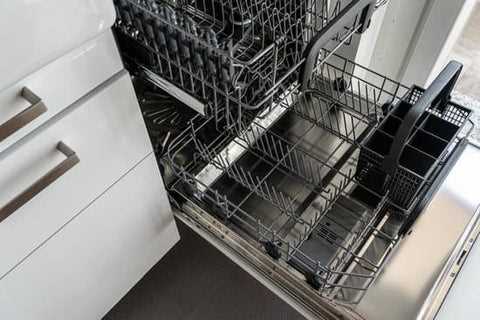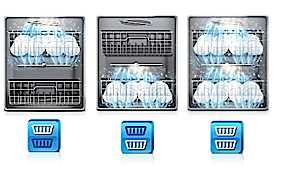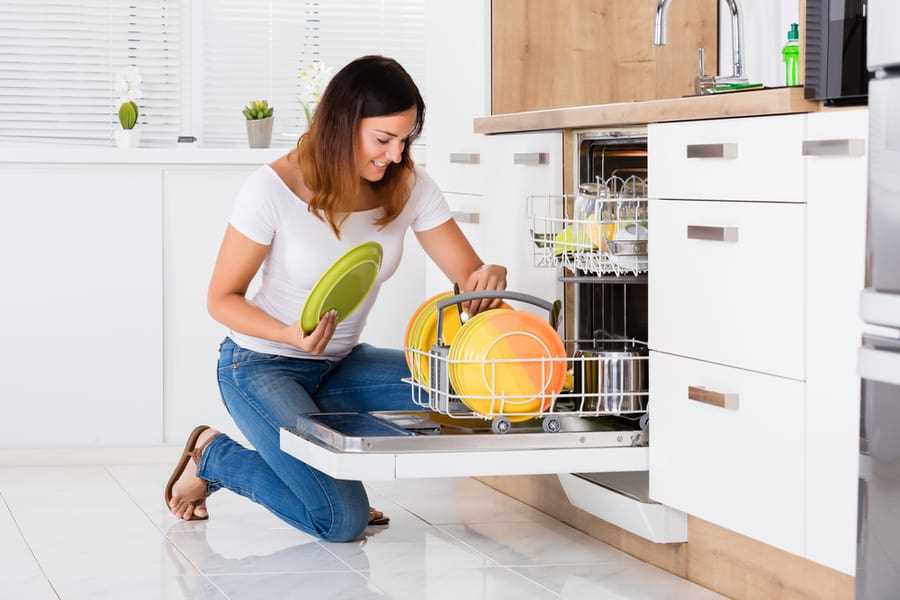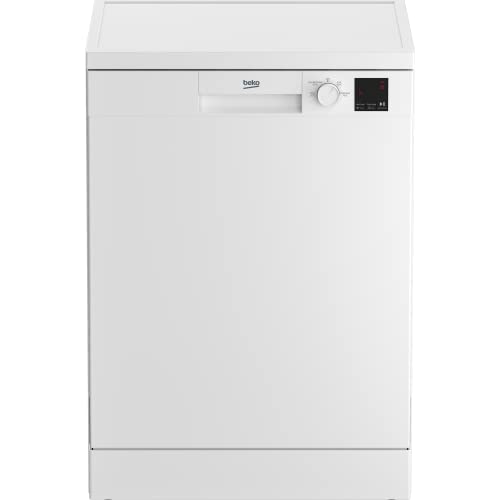


When it comes to doing the dishes, we all want to find the best and most efficient way to get them clean. That’s where dishwashers come in, and understanding the different settings on these appliances is essential. One important setting to be aware of is the “half load” option.
The half load option, as the name suggests, allows you to wash a smaller load of dishes. It’s perfect for those times when you don’t have enough dirty dishes to run a full load. Using the half load setting prevents you from wasting water and energy by running a full cycle when it’s not necessary.
But what does it mean for your dishes? Does using the half load option mean that they won’t get as clean? The answer is no. Dishwashers with this option are designed to perform just as well with a smaller load. The water jets and detergents are still able to reach all areas of the dishwasher, ensuring that your dishes come out spotless every time.
Not only does using the half load setting save you money on water and energy bills, but it also saves you time. Running a shorter cycle means that your dishes will be ready to use again sooner. And with fewer dishes in the dishwasher, it’s easier to empty and load the machine.
It’s important to note that not all dishwashers have a half load option, so if this is something that’s important to you, be sure to check the features of the model before making a purchase. Additionally, it’s always a good idea to read the manufacturer’s instructions and recommendations for using the half load setting to ensure you get the best results.
So, next time you find yourself with a smaller load of dishes, give the half load option a try. You’ll save money, time, and still get clean dishes. That’s a win-win in our book!
What Does Half Load on a Dishwasher Mean?
When it comes to washing your dishes, you must understand the meaning of “half load” on a dishwasher. This function allows you to run a cycle when you don’t have a full load of dishes to clean. It is an economical option that helps you save water, energy, and detergent.
The Benefits of Half Load

Running your dishwasher on a half-load setting has several benefits:
- Save Water: By using the half-load function, you can still get your dishes cleaned without wasting unnecessary water. This setting ensures that you are being water-conscious, especially for households that may not have enough dishes to fill a full load.
- Save Energy: Similar to saving water, running your dishwasher on a half-load setting helps you save energy. You won’t be using as much power to heat water and run the machine, resulting in reduced energy consumption and lower utility bills.
- Save Detergent: Using the half-load function prevents detergent wastage. When you use a full load setting, you may end up using more detergent than necessary, which can be expensive and harmful to the environment. With a half-load, you only need to use half the amount of detergent, saving you money and reducing chemical waste.
- Clean-Up Convenience: Washing your dishes in a half-load mode is an excellent option for when you need certain utensils or dishes cleaned quickly. If there is a specific item or set of dishes that you need for immediate use, using the half-load setting will allow you to get them cleaned without waiting for a full load.
How Does Half Load Work?
When you select the half-load function on your dishwasher, the machine will only use the necessary amount of water and energy to clean the dishes that are loaded. The machine will still go through a normal wash cycle, involving rinsing, spraying water onto the dishes through jets, and using detergent to remove stains and smells.
If you frequently run your dishwasher on a half-load setting, then it is essential to check the manufacturer’s instructions on your particular brand and model. Some dishwashers have a diverter that directs the water and detergent to the lower section of the dishwasher, ensuring effective cleaning even with a smaller load.
Does Half Load Really Clean My Dishes?
The half-load function on dishwashers is designed to clean your dishes just as effectively as a full load. However, it is important to note that if you often run your dishwasher on a half-load setting, you may have to run it more frequently to ensure that all your dishes are cleaned. Half-load cycles are best suited for smaller loads or items that require immediate cleaning.
In conclusion, understanding the meaning and function of “half-load” on your dishwasher can help you save water, energy, and detergent. It can also provide convenience for when you need a quick clean-up. Just make sure to follow the manufacturer’s instructions for the best results.
Understanding the Concept and Benefits of Half Load

When it comes to household chores, one task that can take up a significant amount of time is doing the dishes. Luckily, dishwashers have become a common appliance in many homes, making this chore much easier and efficient. However, did you know that most dishwashers come with a useful half load option?
Many people may wonder what exactly the half load option does and if it is worth using. Well, the half load option does exactly what its name suggests – it allows you to wash a smaller load of dishes. This can be beneficial for several reasons.
The Benefits of Choosing the Half Load Option:
- Saves Time and Energy: If you have a smaller load of dishes to wash, using the half load option can save you time and energy. Instead of waiting until you have a full load to run the dishwasher, you can clean your dishes as you go. This means fewer dishes piling up and less time spent loading and unloading the dishwasher.
- Saves Water and Detergent: Running a full dishwasher requires more water and detergent. By opting for the half load option, you can avoid wasting water and detergent on fewer dishes. This not only helps you save money on your utility bills but also reduces your environmental footprint.
- Allows for Flexibility: Some dishwashers have a layout that makes it difficult to load a full load of dishes without overcrowding or blocking the water flow. Using the half load option allows you to have a more flexible dishwasher loading experience. You can arrange your dishes more easily and ensure that each item gets cleaned properly.
- Reduces Bad Smells: If you don’t have enough dishes to fill a full load, leaving dirty dishes in the dishwasher for too long can lead to unpleasant odours. By using the half load option and running the dishwasher more frequently, you can avoid any bad smells and keep your kitchen smelling fresh.
Now, you may be wondering how you can select the half load option on your dishwasher. Well, it is usually as simple as pressing a button or selecting a specific setting on the dishwasher’s control panel. Refer to your dishwasher’s manual or check the manufacturer’s website for detailed instructions related to your specific dishwasher model.
Overall, choosing the half load option on your dishwasher can be a convenient and economical choice. It allows you to save time, water, and detergent, while ensuring your dishes are properly cleaned. So, the next time you have just a few dishes to wash, don’t hesitate to use the half load option and enjoy the benefits it brings!
The Importance of Cleaning Your Dishwasher Regularly

Cleaning your dishwasher regularly is one of the best things you can do to ensure it works well and lasts for a long time. Many people only think about cleaning their dishes, but neglect cleaning the machine that cleans their dishes. This can lead to a buildup of grime, grease, and food particles that can affect the dishwasher’s performance and even shorten its lifespan.
One of the main benefits of cleaning your dishwasher regularly is that it helps to prevent odors. The warm and damp environment inside the dishwasher can create the perfect breeding ground for bacteria and mold. By cleaning the dishwasher, you can remove any lingering food particles or residue that can cause unpleasant smells.
Cleaning your dishwasher also helps to improve its efficiency. Over time, mineral deposits can accumulate in the dishwasher’s spray arms and nozzles, which can affect its ability to spray water effectively. Cleaning these parts regularly will ensure the dishwasher operates at its best and provides clean dishes every time.
Another important aspect of dishwasher cleaning is the removal of hard water deposits. Hard water can leave mineral stains on glasses and other dishes. Regular cleaning helps to prevent these stains and keeps your dishes looking their best.
There are a few different options for cleaning your dishwasher. One common method is to run an empty dishwasher with a cleaning tablet or a mixture of vinegar and water. The cleaning tablet or vinegar will help to remove any buildup and leave your dishwasher clean and fresh. Another option is to remove and clean the dishwasher’s filter and spray arms manually.
It is also important to regularly clean the dishwasher’s door gasket, as this is where food particles and debris can easily accumulate. A mild detergent, warm water, and a toothbrush can be used to clean the gasket thoroughly.
In conclusion, cleaning your dishwasher regularly is worth the effort. It helps to prevent odors, improve efficiency, and prolong the lifespan of the appliance. By taking the time to clean your dishwasher, you can ensure that it continues to work effectively, providing you with clean and sanitary dishes time and time again.
How Often Should You Clean Your Dishwasher?
If you own a dishwasher, you’ll know how convenient and time-saving it is to have clean dishes without the hassle of handwashing. However, it’s important to keep your dishwasher clean as well to ensure it functions at its best and to prolong its lifespan.
Why Should You Clean Your Dishwasher?
Regular cleaning of your dishwasher not only helps to maintain its performance but also provides several benefits. Here are some reasons why you should clean it:
- Prevents Bad Odors: Over time, food particles and grease can accumulate in the nooks and crannies of your dishwasher, causing unpleasant smells. Cleaning your dishwasher regularly helps eliminate these odors, ensuring your dishes come out smelling fresh.
- Improves Efficiency: A clean dishwasher can perform its job more efficiently. It prevents clogs in the jets and ensures proper water flow, resulting in cleaner and more spotless dishes.
- Prevents Wastage: When your dishwasher is clogged with debris, it may not clean your dishes thoroughly. This can lead to rewashing or handwashing, wasting water, energy, and time.
- Extends Lifespan: Regular cleaning prevents the buildup of mineral deposits, which can lead to clogs and other mechanical issues in the long run. Keeping your dishwasher clean can extend its lifespan, saving you money on repairs or replacement.
How Often Should You Clean Your Dishwasher?
The frequency of dishwasher cleaning depends on the usage and water conditions in your area. However, a general guideline is to clean your dishwasher at least once a month.
If you notice any of the following signs, it’s a good idea to clean your dishwasher sooner:
- Smells coming from your dishwasher after a cycle
- Visible residue or buildup on the interior walls or racks
- Poor cleaning performance
How to Clean Your Dishwasher

Here’s a step-by-step guide on how to clean your dishwasher:
- Empty the dishwasher: Remove all dishes and utensils from the dishwasher.
- Inspect the dishwasher: Check for any food particles or debris in the bottom of the dishwasher and around the drain area.
- Clean the filter and drain: Remove the filter and clean it thoroughly. Use a toothbrush or scrub brush to remove any residue. Check the drain for any clogs and clear them if necessary.
- Wipe down the interior: Use a damp cloth or sponge to wipe down the interior walls, racks, and door. Pay attention to the nooks and crannies where food particles can build up.
- Run a cleaning cycle: Run a cleaning cycle using a dishwasher cleaner or a mixture of vinegar and baking soda. Follow the instructions on the cleaning product for the best results.
- Wipe down the exterior: Clean the exterior of the dishwasher, including the control panel and door, using a mild detergent and water.
- Replace the filter: Once the dishwasher is clean and dry, replace the filter and any removable parts.
By following these steps regularly, you can keep your dishwasher in optimal condition and enjoy clean and spotless dishes after every load.
In Conclusion
Regular cleaning of your dishwasher is essential for maintaining its performance and prolonging its lifespan. Cleaning it at least once a month helps prevent bad odors, improves efficiency, prevents wastage, and extends the lifespan of your appliance. By following the steps mentioned above, you can easily clean your dishwasher and keep it in top shape for years to come.
Signs That Your Dishwasher Needs Cleaning
- If your dishwasher is not functioning as it normally does, it may be a sign that it needs cleaning.
- If your dishes come out smelling bad or with food particles still stuck to them after a cycle, it’s a clear indication that your dishwasher needs to be cleaned.
- Another sign to look out for is if your dishwasher takes longer than usual to complete a cleaning cycle. This may indicate that the jets and other parts of the machine are clogged and need to be cleaned.
- If you notice a buildup of limescale or mineral deposits on the interior of your dishwasher, it is essential to clean it.
- When your dishwasher starts making strange noises or sounds, it’s a strong indication that it needs to be cleaned.
- If you find that the dishes are not being washed thoroughly or that some items are coming out dirty even after a full cycle, it’s time to clean your dishwasher.
- Furthermore, if you observe that the water does not drain properly from the dishwasher after a cleaning cycle, it is a clear sign that it needs to be cleaned.
- When you see that there is an accumulation of detergent residue or grease in the dishwasher, it is necessary to clean it.
- If you notice a bad smell coming from your dishwasher, it is an indication that it needs cleaning.
Keeping your dishwasher clean is vital not only for its functioning but also for the cleanliness of your utensils. Regular cleaning of the dishwasher can save you money in the long run, as it prevents the need for costly repairs or even a replacement of the appliance. It also helps to ensure that your dishes are washed thoroughly and come out smelling fresh.
If you are wondering how to clean your dishwasher, the first step is to consult the user manual that came with your dishwasher. Each dishwasher model may have specific cleaning recommendations that you should follow carefully. However, if your dishwasher doesn’t provide detailed instructions, you can follow these general steps:
- Empty the dishwasher: Make sure it is empty of dishes and utensils before starting the cleaning process.
- Remove any food debris: Check the bottom of the dishwasher and remove any food particles or debris that may have accumulated.
- Clean the filters: Take out the filters and rinse them thoroughly to remove any trapped dirt or debris.
- Clean the spray arms: Inspect the spray arms and use a small brush or toothpick to remove any clogs or buildup.
- Run a cleaning cycle: Place a dishwasher-safe cleaning tablet or a cup of white vinegar on the top rack of the empty dishwasher. Then run a hot water cycle to clean and disinfect the interior.
- Wipe the interior: Once the cleaning cycle is complete, use a damp cloth to wipe down the interior of the dishwasher, paying special attention to the door seals and edges.
- Inspect the jets: Check the jets for any blockages and use a toothpick or small brush to remove any debris that may have accumulated.
- Final rinse: To remove any lingering vinegar or cleaning tablet residue, run a short rinse cycle with no detergent or dishes.
Remember, cleaning your dishwasher regularly will help extend its lifespan and ensure that it functions optimally. For more information on dishwasher cleaning, you can visit our website or refer to your dishwasher’s user manual.
How to Properly Clean Your Dishwasher
Keeping your dishwasher clean is essential to ensure it functions properly and effectively. Regular cleaning will help eliminate odors and maintain the performance of your dishwasher, ensuring your dishes come out clean every time. Here are some steps to help you properly clean your dishwasher:
1. Empty and Prepare the Dishwasher
Before you start cleaning, make sure the dishwasher is empty. Remove any dishes, utensils, and baskets from the dishwasher. Check the filter and remove any food particles or debris that may have collected.
2. Clean the Interior
Start by wiping down the interior of the dishwasher with a damp cloth. Pay attention to areas like the door seal, corners, and racks where dirt and residue can accumulate. Use a mild detergent or dishwasher cleaner to clean the interior thoroughly. Be sure to follow the manufacturer’s instructions for any specific cleaning products.
3. Clean the Spray Arms and Jets
The spray arms and jets are responsible for distributing water and detergent to clean your dishes. Over time, they can become clogged with food particles or mineral deposits. Remove the spray arms and jets and clean them with a brush or toothpick. Ensure that the holes in the spray arms are clear and free from any obstruction.
4. Run a Cleaning Cycle
Most dishwashers have a special cleaning cycle that helps remove any remaining residue or odors. Refer to your dishwasher’s manual to locate the specific cleaning cycle setting. Run this cycle without any dishes or detergent. Some dishwashers also offer a self-cleaning function, which further helps to remove buildup and debris.
5. Clean the Exterior
Don’t forget to clean the exterior of your dishwasher as well. Wipe down the control panel, door, and handle with a damp cloth and mild detergent. Pay attention to any buttons or crevices where dirt may accumulate. Polish the exterior for a shiny finish, if desired.
6. Maintain Regular Cleaning
Cleaning your dishwasher should be done on a regular basis, ideally once a month or as needed. Regular cleaning will prevent the buildup of food particles, odors, and residue, ensuring that your dishwasher continues to work efficiently.
Remember, a clean dishwasher means cleaner dishes, and it can also help save you money by prolonging the life of your dishwasher and reducing the need for repairs. If you have any questions about how to properly clean your dishwasher or troubleshoot any related issues, it is always best to consult the manufacturer’s guidelines or seek help from a professional.
FAQ
What does “half load” mean on a dishwasher?
When a dishwasher has a “half load” option, it means that you can run the dishwasher with only half the amount of dishes it normally holds. This can be useful if you have a smaller load of dishes that need to be washed.
How does the “half load” option work on a dishwasher?
When you select the “half load” option on a dishwasher, it adjusts the water and energy consumption to match the smaller load. It may also modify the washing and drying times to ensure efficient cleaning and drying of the dishes.
Why would I use the “half load” option on my dishwasher?
The “half load” option can be useful in several situations. If you have a smaller load of dishes, using this option saves water and energy compared to running a full cycle. It can also be handy if you need certain dishes washed quickly and don’t want to wait for a full load.
Will using the “half load” option on my dishwasher clean the dishes as effectively as a full load?
The “half load” option is designed to clean the dishes effectively, but keep in mind that it’s most efficient when used with an appropriate load size. If you overload the dishwasher or place larger items that block the spray arms, it may not clean as effectively as a full load.
Can I mix different types of dishes when using the “half load” option on my dishwasher?
Yes, you can mix different types of dishes when using the “half load” option. However, it’s important to arrange them properly to ensure proper cleaning and avoid any damage. Make sure to place delicate items securely and avoid blocking the spray arms.
Does using the “half load” option save water and energy on my dishwasher?
Yes, using the “half load” option on your dishwasher can save water and energy. Since it uses less water and energy compared to a full cycle, it is a more efficient option when you have a smaller load of dishes to wash.
Can I use the “half load” option on my dishwasher for every load?
While you can use the “half load” option on your dishwasher for every load if you prefer, it’s important to note that it is most efficient when used with an appropriate load size. If you consistently use a full load, it may be more efficient to run a full cycle instead of using the “half load” option every time.












